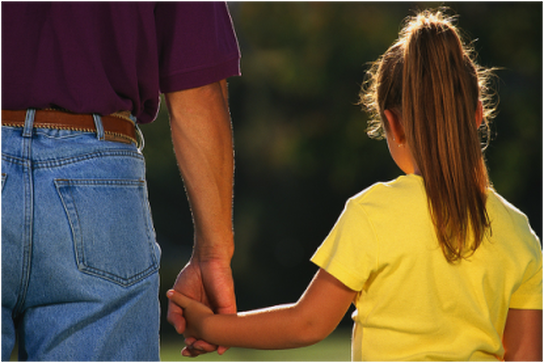Children & Loss

Why are younger children not so interested in adult detail or logic, when it comes to coping with death . How are their perceptions different?
When that pet is lost children grieve differently to adults, they look to their parents for guidance in this new experience. They learn by parents behaviours at this time so it is an important time when they need and want special support, guidance to make sense of their loss and how to mourn. They look to their parents help them memorialize and remember their beloved pet.
Adults on the other hand get caught up in our own “grownup experience”and their judgements and behaviours surrounding grief can be based on our societies perception that children at this time should be protected and sheltered from the death experience. An adults reaction in a lot of cases then is to hold back their own emotion so that the children do not see their pain but instead the children are craving a role model to show them how to deal with the experience.
By adults not showing emotion it not only is detrimental to their own healing process but sends out the wrong example of how to effectively grieve and resolve grief. What adults fail to realise is that in an indirect way these children have already been exposed to death by means of cartoons and programs on television plus they know of death through friends and schoolmates, children already have a sort of perspective on death based on this interaction.
At a time when children are learning and absorbing everything and anything around them it should be acknowledged that they need and want to be involved in the experience not left out. They want to learn how to grieve which will help them manage how they deal with death into their adult years.
Adults make the process complex by their own learned association with death, when really children are quite simplistic in their approach at this stage of their lives just looking to be recognised for their grieving, involved in the families grieving process, getting help in understanding it, mourning the pets loss, and finally resolving and memorializing their beloved pet.
Who else, besides the parents, can help the child cope with the loss of a beloved pet?
School teachers should be informed and made aware of what has happened so that they can keep an eye on the child and check for any signs of distress or impacts from grief. It could be suggested that the teacher actually acknowledge the death of their pet and have incorporate in their teachings a forum where some that the children can share their feelings and thoughts about losing their pets.
This could provide support to the child through their friends and classmates and support them in knowing they are not alone. Also the teacher could get the children to draw pictures of their pets that they own or have lost and they could go up on the wall in class. Like a memorial wall.
Siblings could be encouraged to make a scrapbook, fill it with memorabilia and drawings of the pet so that any point they can refer to it and share the good times and memories that they have of their beloved pet.
Use the immediate family as support, maybe one of the siblings possibly older have their own pet like guinea pigs or mice and they might be open to or encouraged to sharing their pet with during the childs grieving time, just until it is a little less raw. This could also be an option with relatives.
If the child goes to Sunday school or similar then the church could acknowledge the death of their pet and have a workshop where the children do painting or drawing pets in heaven and have a little service around the loss of a pet and pets in heaven.
Ask the school Librarian to recommend some books that might include story lines surrounding death of a pet for the grieving child to read.
When that pet is lost children grieve differently to adults, they look to their parents for guidance in this new experience. They learn by parents behaviours at this time so it is an important time when they need and want special support, guidance to make sense of their loss and how to mourn. They look to their parents help them memorialize and remember their beloved pet.
Adults on the other hand get caught up in our own “grownup experience”and their judgements and behaviours surrounding grief can be based on our societies perception that children at this time should be protected and sheltered from the death experience. An adults reaction in a lot of cases then is to hold back their own emotion so that the children do not see their pain but instead the children are craving a role model to show them how to deal with the experience.
By adults not showing emotion it not only is detrimental to their own healing process but sends out the wrong example of how to effectively grieve and resolve grief. What adults fail to realise is that in an indirect way these children have already been exposed to death by means of cartoons and programs on television plus they know of death through friends and schoolmates, children already have a sort of perspective on death based on this interaction.
At a time when children are learning and absorbing everything and anything around them it should be acknowledged that they need and want to be involved in the experience not left out. They want to learn how to grieve which will help them manage how they deal with death into their adult years.
Adults make the process complex by their own learned association with death, when really children are quite simplistic in their approach at this stage of their lives just looking to be recognised for their grieving, involved in the families grieving process, getting help in understanding it, mourning the pets loss, and finally resolving and memorializing their beloved pet.
Who else, besides the parents, can help the child cope with the loss of a beloved pet?
School teachers should be informed and made aware of what has happened so that they can keep an eye on the child and check for any signs of distress or impacts from grief. It could be suggested that the teacher actually acknowledge the death of their pet and have incorporate in their teachings a forum where some that the children can share their feelings and thoughts about losing their pets.
This could provide support to the child through their friends and classmates and support them in knowing they are not alone. Also the teacher could get the children to draw pictures of their pets that they own or have lost and they could go up on the wall in class. Like a memorial wall.
Siblings could be encouraged to make a scrapbook, fill it with memorabilia and drawings of the pet so that any point they can refer to it and share the good times and memories that they have of their beloved pet.
Use the immediate family as support, maybe one of the siblings possibly older have their own pet like guinea pigs or mice and they might be open to or encouraged to sharing their pet with during the childs grieving time, just until it is a little less raw. This could also be an option with relatives.
If the child goes to Sunday school or similar then the church could acknowledge the death of their pet and have a workshop where the children do painting or drawing pets in heaven and have a little service around the loss of a pet and pets in heaven.
Ask the school Librarian to recommend some books that might include story lines surrounding death of a pet for the grieving child to read.


